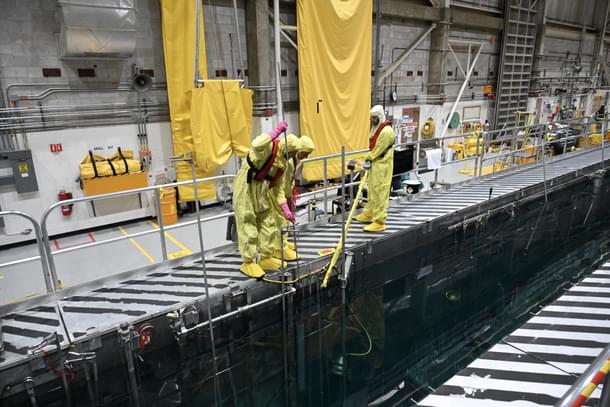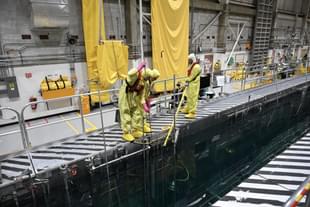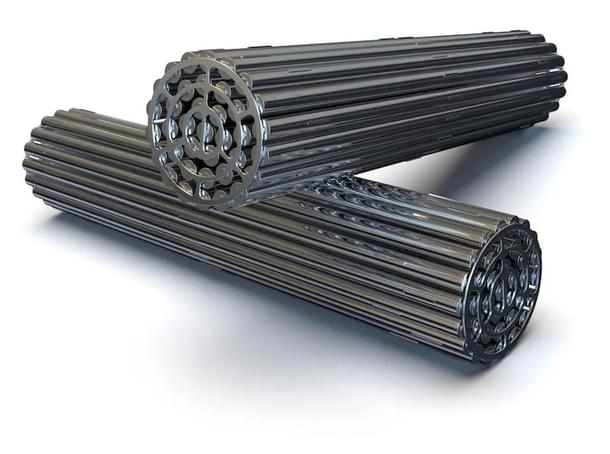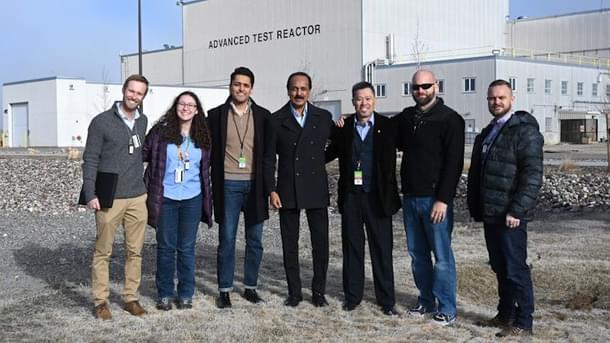Infrastructure
New Nuclear Fuel, Indian-Origin Entrepreneur, And US Firm — The Troika Behind India's Big Bet On Small Nuclear Reactors
Amit Mishra
Aug 21, 2024, 05:58 PM | Updated Aug 23, 2024, 04:02 PM IST
Save & read from anywhere!
Bookmark stories for easy access on any device or the Swarajya app.


India's nuclear energy sector is poised for a major reboot, thanks to an innovation by an American company founded by an Indian-origin entrepreneur.
Clean Core Thorium Energy, set up by Mehul Shah, has developed and patented a new nuclear fuel that could unlock India's vast thorium reserves for energy production.
The Chicago-based company calls this concoction "ANEEL" (Advanced Nuclear Energy for Enriched Life) in honour of Dr Anil Kakodkar, a prominent nuclear scientist and former chairman of the Atomic Energy Commission (AEC).
The fuel is made of thorium and uranium of a certain level of enrichment, called "HALEU" (High Assay Low Enriched Uranium). This proprietary mix minimises uranium use while delivering cleaner, safer, and more efficient energy.

So, what makes it a game changer?
The current fleet of nuclear reactors runs primarily on uranium enriched up to 5 per cent, uranium-235 (U-235). HALEU, which is uranium enriched to more than 5 per cent but less than 20 per cent and is more powerful than standard nuclear fuel, is not yet widely available commercially.
Only Russia and China have the infrastructure to produce HALEU at scale, with Centrus Energy in the United States (US) beginning production of HALEU from a demonstration-scale cascade in October 2023.
Clean Core’s imminent commercial timeline could boost confidence among HALEU suppliers and introduce a crucial alternative in the nuclear fuel market.
For India, this advancement is profoundly significant, given that the country possesses nearly a quarter of the world’s thorium reserves, estimated at 1.07 million tonnes.
However, thorium (Th-232) is not naturally fissile and cannot be directly used in nuclear reactors. It must first be converted into uranium-233, a process that typically requires U-235 or plutonium-239 — both challenging to source.
ANEEL offers a faster, more practical solution for harnessing thorium as a primary energy source. Instead of relying on the conventional, drawn-out process, ANEEL fuel can accelerate thorium use, perfectly aligning with India’s three-stage nuclear programme.
Precise Fit
The real advantage of ANEEL lies in its compatibility with India's pressurised heavy water reactors (PHWRs), a technology where India has established expertise.
ANEEL fuel enhances performance of existing heavy water reactor systems by leveraging thorium's superior properties while maintaining the design, as in the currently used natural uranium (NU) fuel bundles.
This results in a dramatic efficiency boost, with a burn-up of 60,000 MW-days per tonne, compared to 7,000 MW-days per tonne for conventional NU fuel.
To put it into perspective, a 220 MW PHWR in India would require around 175,000 NU fuel bundles over 60 years. With ANEEL, only 22,000 bundles would be needed, significantly reducing waste volumes and lowering operational costs.
Strategically, ANEEL also offers proliferation resistance, as its spent fuel is less likely to be weaponised.
Due to the inherent benefits of using thorium, the spent ANEEL fuel cannot be used for weapons — a source of comfort for foreign uranium suppliers and reactor operators, Shah told Business Line.
Transition To SMRs
ANEEL could accelerate India's adoption of small modular reactors (SMRs).
These reactors typically have a power capacity of 300 MW or less, which is roughly one-third of that of standard plants. They are more cost-effective to construct, making them an attractive option in the market compared to the bespoke, large-scale power plants known for exceeding budgets and missing deadlines.
With the Union budget signalling a move towards private collaboration in developing Bharat small reactors (BSRs), the AEC is now working on adapting PHWR designs for BSRs, potentially tailored for ANEEL fuel.
The government aims to deploy 50 BSRs domestically and another 50 abroad within the next decade, and ANEEL could provide the crucial momentum needed to launch this ambitious initiative.
What Next
Clean Core, backed by investors like Lakshmi Narayanan, a former chief executive officer of Cognizant Technology, is currently testing ANEEL fuel in the advanced test reactor (ATR) at the Idaho National Laboratory in the US.

The company has also announced the successful completion of the Phase 1 pre-licensing vendor design review process with the Canadian Nuclear Safety Commission.
With the successful completion of the pre-licensing process, Shah anticipates ANEEL fuel will be commercialised as early as 2026, positioning it as a key player in the transition to sustainable energy.





